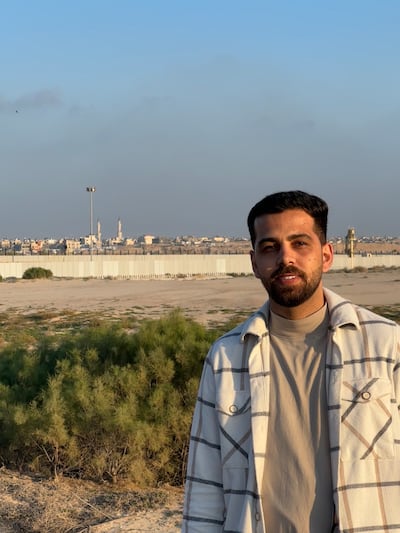Live updates: Follow the latest news on Israel-Gaza
The UAE has doubled the capacity of its desalination plants on the Egyptian side of the Rafah border with the Gaza Strip.
The expanded plants, inaugurated on Sunday by Sheikh Shakhbout bin Nahyan, Minister of State, will supply 4.5 million litres of clean drinking water a day to Gazans.
The plants gather water from the Mediterranean Sea through a system of pipes. The water is then filtered and sent, underground, across the border to the Palestinian enclave.
“Drinking water contains 100 to 800 parts per million [of salt], but the sea gives us around 25,000 parts per million. So, the clean water can now be used for drinking and other uses,” the desalination plants' project manager, Mohammad Al Rashidi, told The National in Rafah.
Before the expansion, the plants had six containers, with a total capacity of 2.25 million litres. That figure has now been doubled, he said.
As part of the UAE's Gallant Knight 3 humanitarian operation to supply aid to Gaza, the UAE has also opened a warehouse in Al Arish, near Rafah, where it is stockpiling aid including nappies, blankets, canned foods, and electric heaters.
These supplies will enter Gaza as soon as border authorities permit.
The UAE has so far supplied more than 9,296 tonnes of aid delivered by 121 lorries and 129 cargo planes.
On the way to Rafah, The National witnessed dozens of lorries carrying aid in boxes set to cross the border.
Over the fence separating Gaza and Egypt, plumes of grey smoke were seen as Israel bombarded the southern part of the Strip on Sunday, bringing the total number of people killed since the October 7 war began to 21,822 with 56,541 wounded.
At least 9,000 children have been killed so far in the war and more than 7,000 people are still missing, while 1.9 million out of the Gaza Strip's population of 2.2 million have been displaced.
Gazan blogger Noureddin Radwan, 28, who was at the desalination plants' inauguration, voiced pain at the thought that his family, residing in Rafah, were so close but so out of reach.

“Take me back,” he said.
He had taken this road to and from Rafah numerous times, he said.
“I could see the Al Taybba mosque, near where my family lives.”
His mother, father, three sisters and two brothers had been displaced since the war began. Originally from Khan Younis, they are now living with extended family members.
“One day, I'll take a picture with them in front of the mosque in Gaza.”

